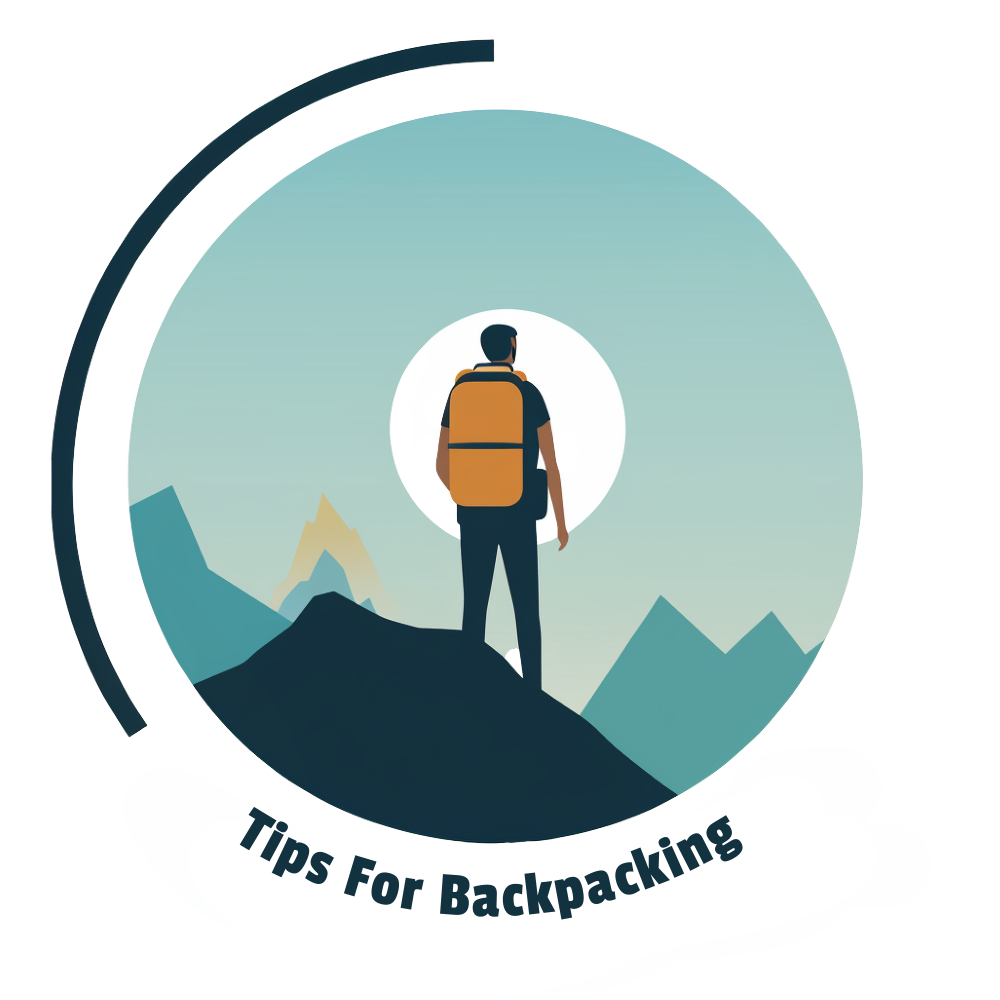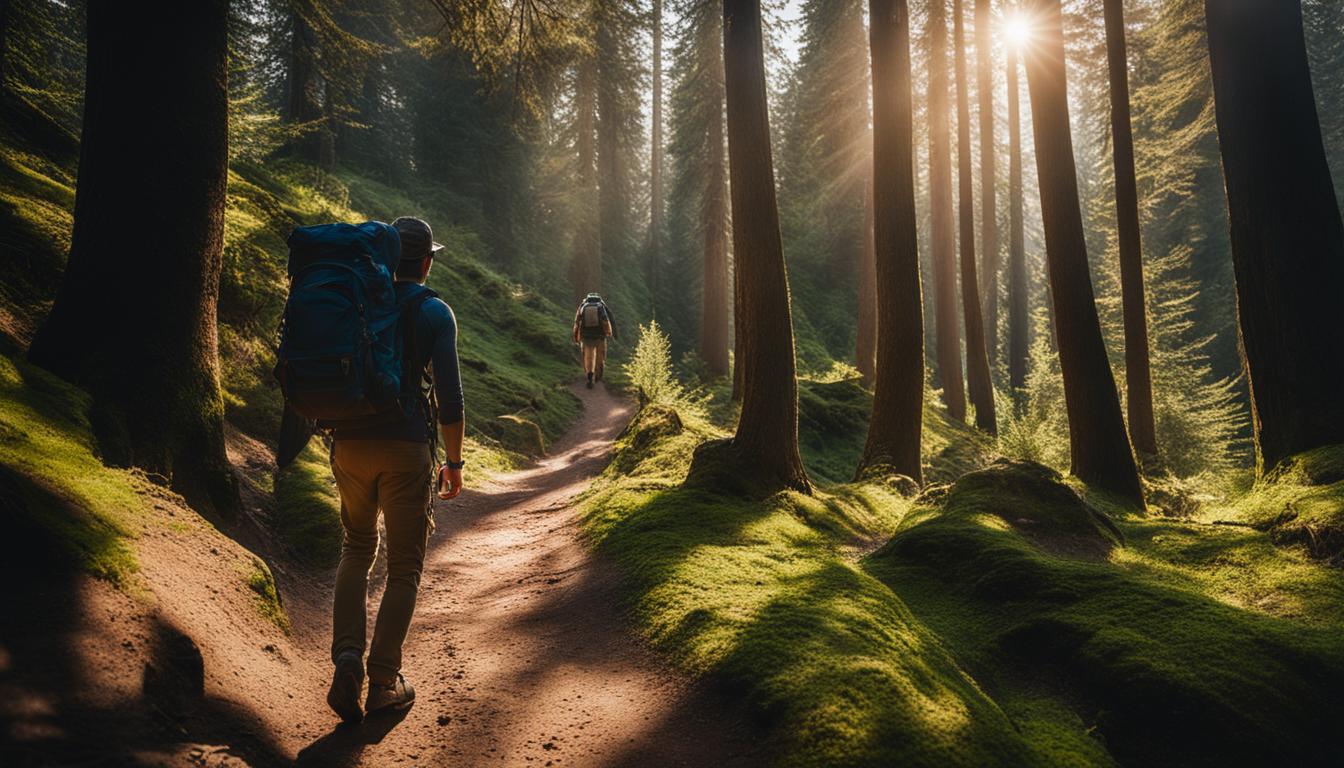Welcome to the world of backpacking! Whether you’re an absolute beginner or have some hiking experience, this introduction will provide you with the essential knowledge you need to start backpacking with confidence.
Starting backpacking with no experience can be intimidating, but with the right skills and preparation, it can be a rewarding and unforgettable adventure. In this guide, I’ll share basic skills needed for backpacking, tips on how to pack efficiently, and how to plan your daily mileage for a successful trip.
Key Takeaways:
- Starting backpacking with no experience is possible and can be a fulfilling adventure.
- Basic skills, such as efficient packing and planning, are essential for a successful trip.
- Backpacking basics for absolute beginners provide the necessary knowledge to embark on your first backpacking adventure.
- Developing essential skills and prioritizing safety are key to enjoying your backpacking trips.
- Remember that backpacking is a journey of self-discovery and adventure, so get ready to explore the great outdoors.
Avoiding Common Backpacking Mistakes
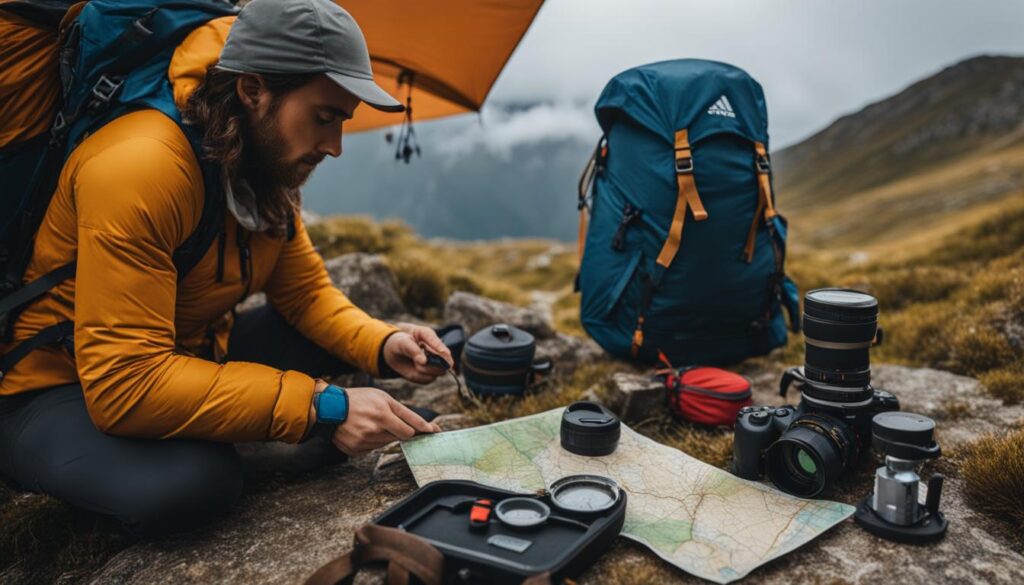
As a beginner backpacker, it’s natural to make mistakes along the way. However, with a little guidance, you can avoid some of the most common rookie errors and have a smoother backpacking experience. Let’s take a look at a few common backpacking mistakes to avoid:
- Overpacking: One of the biggest mistakes beginners make is packing too much gear. Remember, every ounce counts when you’re carrying everything on your back. Stick to the essentials and prioritize lightweight, multi-purpose items.
- Packing the wrong foods: Choosing the right food for your backpacking trip is crucial. Avoid packing heavy, bulky items that spoil easily. Opt for lightweight, nutrient-dense meals and snacks that provide energy without taking up too much space.
- Underestimating physical preparedness: Backpacking can be physically demanding, especially if you’re tackling long distances or challenging terrain. Make sure to train and prepare your body for the trip ahead. Start with shorter hikes and gradually increase your mileage and difficulty level.
By being mindful of these common backpacking mistakes, you can save yourself from unnecessary struggles and have a more enjoyable time on the trail.
Choosing the Right Trail

When it comes to backpacking, choosing the right trail is crucial for a successful and enjoyable experience. It’s important to find a trail that matches your skill level and preferences. Here are some tips on how to choose a backpacking trail:
- Consider your skill level: If you’re a beginner, it’s best to start with a trail that is beginner-friendly and has a moderate difficulty level. Look for trails that are well-marked and well-maintained.
- Location: Decide where you want to go backpacking. Whether you prefer hiking through lush forests, exploring rugged mountains, or trekking along coastal trails, choose a location that aligns with your preferences.
- Amenities: If you’re new to backpacking, you might appreciate trails that offer amenities such as potable water sources, established campsites, and restroom facilities. These amenities can make your trip more comfortable and convenient.
- Elevation Gain: Consider the elevation gain of the trail. If you’re not accustomed to hiking in high altitudes, it’s best to choose a trail with minimal elevation gain to avoid altitude sickness and other potential challenges.
- Online Resources: Take advantage of online resources such as hiking forums, trail reviews, and maps to gather information about potential trails. These resources can provide insights from experienced backpackers and help you make an informed decision.
By considering these factors and doing proper research, you can find a suitable hiking route that matches your abilities and interests. Remember to always be prepared, pack essential gear, and have a sense of adventure as you explore the great outdoors.
Essential Backpacking Skills
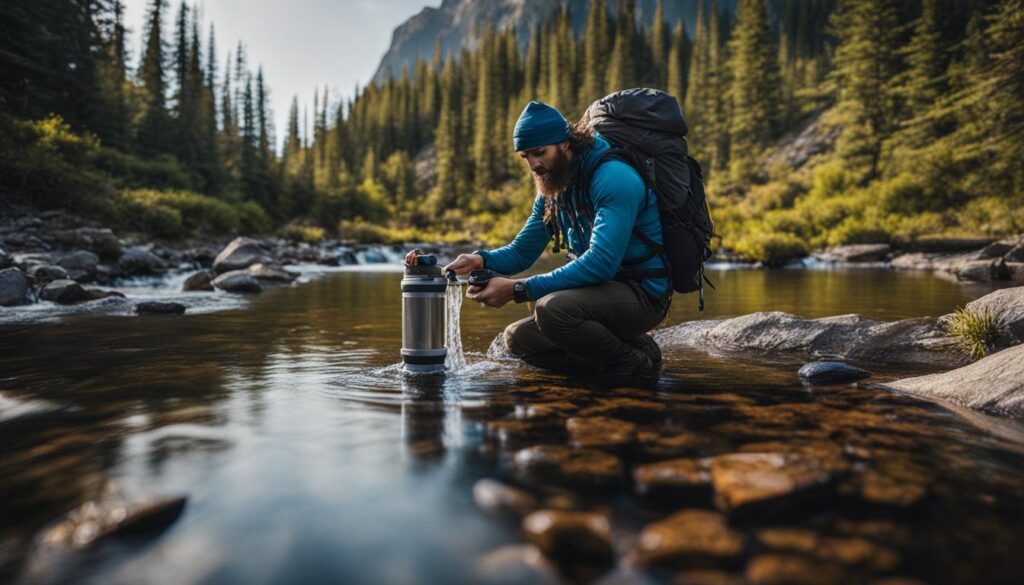
When it comes to backpacking, there are a few key skills that every outdoor enthusiast should have in their arsenal. These skills not only help you navigate the trails effectively but also ensure your safety and enjoyment during your backpacking adventure. Let’s dive into some of the essential backpacking skills that every backpacker should master.
Outdoor Navigation Skills
One of the most important skills for backpackers is the ability to navigate through the great outdoors. Whether you’re trekking through dense forests or hiking across open meadows, knowing how to read topographical maps and use a GPS device is crucial. Understanding contour lines, interpreting symbols, and locating landmarks will help you determine your position and plan your route effectively. Familiarize yourself with navigation tools and practice using them before heading out on your backpacking trip.
Survival Skills
Being prepared for unexpected situations is essential when backpacking in the wilderness. Knowing basic survival skills, such as building a shelter, starting a fire, purifying water, and signaling for help, can make a significant difference in emergency situations. Additionally, learning how to identify edible plants and wildlife tracks can provide you with valuable resources in case of an extended stay in the wild. Take the time to learn these skills and practice them in a controlled environment to build confidence and enhance your backpacking experience.
Campsite Selection
Choosing the right campsite is not just about finding a flat spot to set up your tent. It’s about understanding the impact of your camp on the environment and ensuring your safety and comfort. Look for established campsites whenever possible to minimize your impact on the ecosystem. Consider factors such as proximity to water sources, protection from wind and rain, and the availability of natural features like shade or scenic views. By selecting a suitable campsite, you can make your backpacking journey more enjoyable and sustainable.
Remember, honing these essential backpacking skills takes time and practice. Start by mastering one skill at a time and gradually add more to your repertoire. With each backpacking trip, you’ll become more confident and proficient, allowing you to fully embrace the wonders of the great outdoors.
Safety Precautions for Backpacking
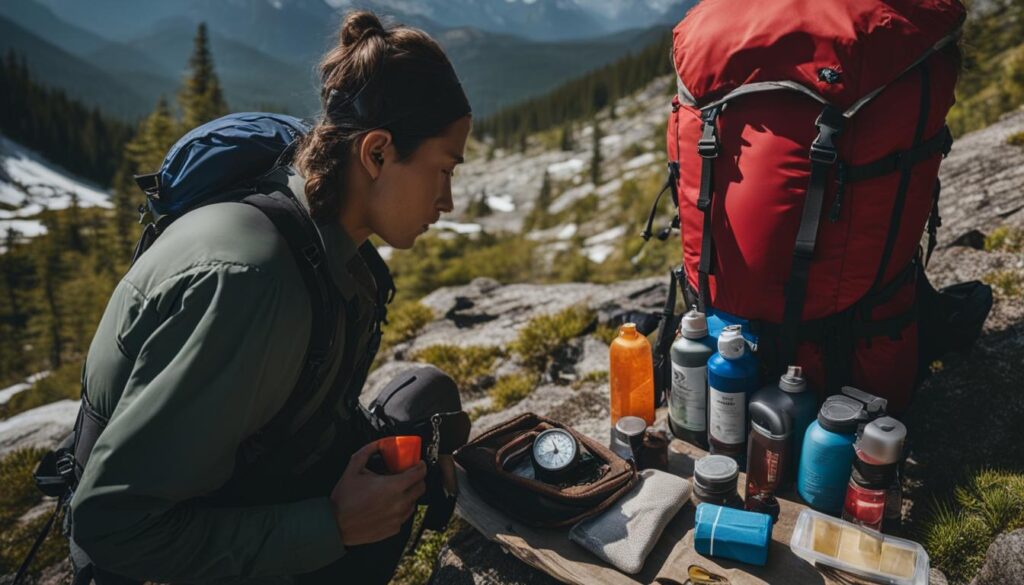
When venturing into the great outdoors, it’s important to prioritize safety to ensure a successful and enjoyable backpacking experience. By following some basic safety precautions, you can minimize risks and be prepared for any outdoor emergencies that may arise. Here are some backpacking safety tips to keep in mind:
- Prepare a contingency plan: Before heading out on your backpacking trip, create a detailed contingency plan. This plan should include information about your intended route, emergency contact numbers, and alternative options in case of unexpected circumstances. By having a well-thought-out backup plan, you can navigate potential challenges with confidence.
- Inform someone of your itinerary: Always let someone know about your backpacking plans. Share your itinerary with a trusted friend or family member and provide them with important details such as your starting point, expected duration, and any checkpoints along the way. This way, if anything goes wrong, someone will know where to look for you.
- Be prepared for emergencies: Accidents can happen even to the most experienced backpackers. Make sure you have the necessary gear to handle outdoor emergencies. This includes a first aid kit, a whistle for signaling, extra food and water, a headlamp or flashlight, matches or a lighter, and a map and compass for navigation purposes. Being prepared can make all the difference in a critical situation.
Remember: Safety should always be a priority when backpacking. Take the time to plan and prepare before your trip, and make sure you have the knowledge and skills to handle any unforeseen circumstances that may arise. Being cautious and proactive can help you enjoy your backpacking adventures to the fullest.
By incorporating these backpacking safety tips into your outdoor excursions, you can ensure a safer and more enjoyable experience. Remember to always stay aware of your surroundings, follow trail regulations, and respect nature. With proper preparation and precautions, you can embark on incredible backpacking journeys with confidence and peace of mind.
Conclusion
Final thoughts on backpacking basics
As we conclude this guide on backpacking basics, I hope you now feel equipped with the knowledge and confidence to embark on your first backpacking adventure. By avoiding common mistakes, choosing the right trail, developing essential skills, and prioritizing safety, you can have a successful and enjoyable experience.
Remember, backpacking is not just about the destination, but also the journey itself. It’s a chance to disconnect from the hustle and bustle of everyday life and connect with nature. Embrace the challenges, relish the breathtaking views, and discover the tranquility that awaits you in the great outdoors.
So, pack your gear, put on your hiking boots, and get ready for an incredible adventure. Whether you’re exploring the scenic trails of the Appalachian Mountains or venturing into the rugged wilderness of the Pacific Crest Trail, backpacking will undoubtedly be a journey of self-discovery and a gateway to unforgettable memories. Happy backpacking!
FAQ
How do I start backpacking if I have no experience?
Starting backpacking with no experience can seem daunting, but it’s actually quite simple. Begin by researching beginner-friendly trails, investing in essential gear and equipment, and gradually building up your hiking and camping skills. It’s also helpful to join a backpacking group or take a guided trip to learn from experienced backpackers.
What are the basic skills needed for backpacking?
The basic skills needed for backpacking include map reading and navigation, setting up a campsite, packing and organizing gear, understanding elevation gain, and practicing Leave No Trace principles. It’s also important to develop physical endurance and know how to handle emergencies in the wilderness.
How do I avoid common backpacking mistakes?
To avoid common backpacking mistakes, make sure to pack light and avoid overpacking, choose the right foods that are lightweight and nutritious, and check the weather forecast before your trip. It’s also important to test your gear before heading out and to plan your daily mileage realistically to prevent exhaustion.
How do I choose the right trail for backpacking?
When choosing a trail for backpacking, consider factors such as location, difficulty level, amenities, and elevation gain. Research the trail online, read reviews, and check with local outdoor organizations for recommendations. It’s important to select a trail that matches your skill level and offers the type of scenery and experience you desire.
What are some essential backpacking skills I should learn?
Essential backpacking skills include reading topographical maps, using a GPS for navigation, understanding elevation gain and loss, finding suitable camping spots, and knowing how to properly set up a tent. It’s also helpful to learn basic wilderness first aid and how to handle common outdoor emergencies.
How can I ensure safety while backpacking?
Ensuring safety while backpacking involves having a contingency plan, letting someone know your itinerary, and carrying necessary safety gear such as a first aid kit, a navigation device, and extra food and water. It’s also important to stay hydrated, be aware of your surroundings, and follow proper wildlife safety protocols.
